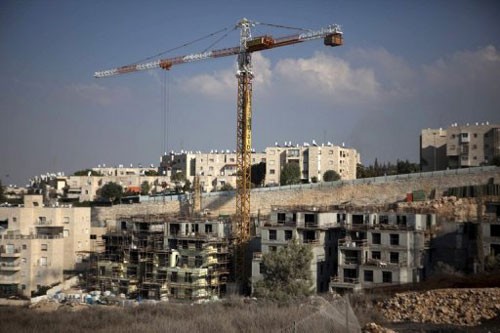(VOVworld) - The road to peace in the Middle East is strewn with obstacles. International diplomatic efforts to bring Palestine and Israel to the negotiating table have been clouded by clashes and disagreements over the building of Jewish settlements. Palestine wants Israel to stop building settlements in the occupied territories. Israel insists Jerusalem is its permanent and indivisible capital. VOV comments:

Israel's housing projects in Gilo, east Jerusalem (photo: AFP) |
In the latest development, Israeli Prime Minister Benjamin Netanyahu says Israel will continue go on with the construction of Jewish settlements in Jerusalem, ignoring strong criticism from the EU. He insisted in a weekly cabinet meeting on October 20, that Jerusalem is Israel’s capital and he will continue to support building in Jerusalem, just as people build in every capital – London, Paris, Washington or Moscow. On October 18, the Israeli Interior Ministry adopted plans to build some 800 new housing units in Gilo on land occupied since 1967 and declared part of Jerusalem but unrecognized by the international community.
On October 20, the MV Estelle, a Finnish-flagged ship carrying a crew of international activists supporting Palestine, was attacked by Israel Defense Forces when it was about 35 nautical miles from Gaza Strip’s cosat. Mustafa al-Barghouti, Secretary General of the Palestinian National Initiative, said Israel threatened to board and arrest the activists if the ship continued heading to Gaza. Meanwhile, Emir of Qatar Sheikh Hamad bin Khalifa Al Thani made a historic visit to the Gaza strip to attend the groundbreaking ceremony for a residential project named after him. He pledged to increase a fund for Gaza from 254 million USD to 400 million USD. Tel Aviv officials criticized the Emir’s trip for undercutting peace efforts.
Obviously, achieving peace and two-state coexistence will be impossible to realize if Tel Aviv continues its current activities. Many accuse Tel Aviv of spoiling the fragile peace process. Palestinian President Mahmoud Abbas has asked Israel to respect 4 things: the two-state principle based on the border line before 1967, a moratorium on building Jewish settlements, the release of Palestinian prisoners, and a renewal of bilateral commitments signed since 2000. On October 17, Abbas sent a letter to US President Barack Obama outlining Palestine’s conditions for resuming negotiations with Israel, a US ally. Palestine’s conditions are inconsistent with Israeli activities.
EU High Representative on Foreign Affaris and Security Policy Catherine Ashton has called Jewish settlements illegal under international law. Other observers pointed out that the construction violates Israel’s commitments under the 2003 peace roadmap and will reduce recent progress.
Meanwhile, Palestine has seen new developments. On October 21, supporters of the Fatah movement of President Mahmoud Abbas denounced victory in the first election in the West Bank since 2006. Hamas’ refusal to participate in the election reflected a bitter division in the Palestinian administration. This has increased pressure on Abbas’s administration to boost the economy. Jihad Al Wazir, Governor of the Palestine Monetary Authority says the administration maybe unable to pay its state employees next month as it can not borrow any more money from local banks.
The conflict between Israel and Palestine is the most prolonged war in modern history. The peace process has repeatedly stalled. Recent developments have done little to encourage hopes for peace in the Middle East.